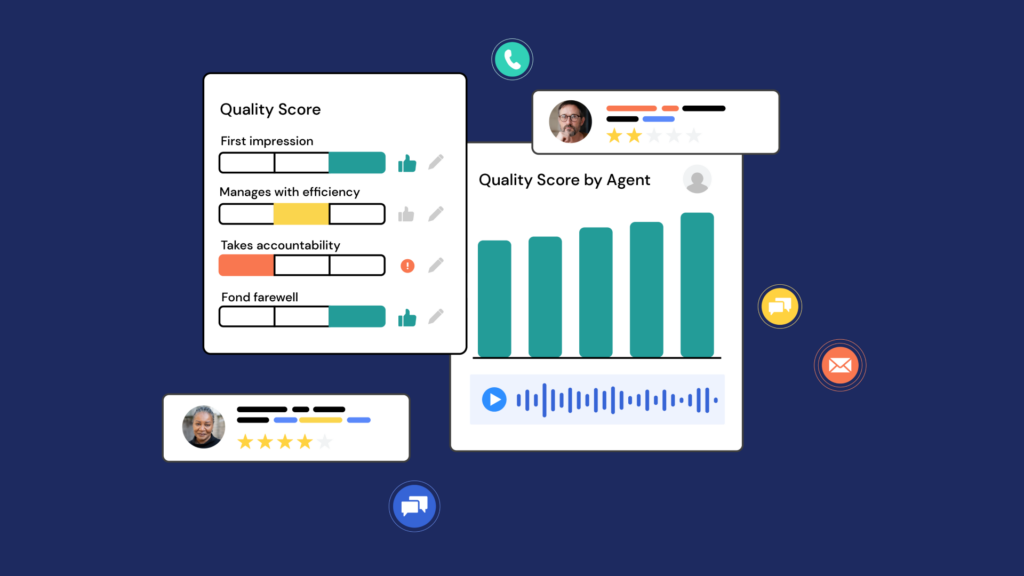Using AI in call centers improves operations with QA support and agent insights.
Reveal qualitative feedback by tapping into existing customer conversations. This unfiltered, renewable source of insights accounts for every customer voice – even those who don’t respond to surveys.
Start Listening
How AI Is Changing the Way Healthcare Listens

Call Monitoring that tracks data and increases call quality.
Track and increase your overall member services call quality score and monitor customer calls with Authenticx.
AI in Call Centers
In recent years, engineers and developers have worked countless hours improving artificial intelligence (AI) and machine learning (ML) technologies. Thanks to their tireless efforts, AI and ML software solutions are now an integral part of many modern businesses’ daily operations. Artificial intelligence can help companies in a variety of ways. First and foremost, AI technology allows human employees to spend less time on repetitive, menial tasks that can be completed effortlessly and much more quickly thanks to AI. This allows human employees to spend more time and effort on tasks that require more of their skills and attention spans.
Artificial intelligence technology can also help reduce the frequency or likelihood of human error disrupting operations. While human beings are far from perfect, artificial intelligence’s ability to reduce the frequency of errors or mistakes can, over time, save thousands of hours of labor which means businesses can save time and money and divert their resources elsewhere. Additionally, AI technology is available and functional around the clock – it does not have to take coffee or lunch breaks, and it can accomplish much more than a human counterpart could in the same amount of time.
AI is also being leveraged as a powerful tool in organizations’ customer data aggregation initiatives. As more companies come to realize the value of their customers’ data, more businesses have invested in AI solutions to help improve their data collection strategies. This can be especially beneficial within call center environments where gross volumes of data are exchanged and generated on a daily basis.
AI call center companies are revolutionizing the way in which modern businesses devise their contact and call center systems. Call center automation AI can help businesses record call center interactions and translate that information into text or other easy-to-analyze formats for data analysis purposes. And when combined with speech analytics software, artificial intelligence and machine learning technology can help call centers analyze transcripts to help identify recurring themes or trends and recognize the most common complaints or concerns among callers. AI can also simultaneously provide agents with real-time data about key performance indicators (KPIs).
AI in call centers can also provide organizations with a ‘virtual customer assistant’ in some cases. Like human agents, virtual customer assistants can help reduce queue waiting times while gathering additional information for human agents who can then quickly take over and help the caller resolve their issue or question. With powerful AI call monitoring features, identifying distinguishing call criteria for agents is easier and simpler than ever before.
There are numerous challenges to running a successful automated call center – meaning management or supervisory personnel will likely have to overcome several challenges. But when capable leaders combine forces with the best technology available, virtually anything becomes possible.
Call Center Automation
Call center automation doesn’t necessarily involve replacing human workers with an automated answering machine – process automation seeks to identify ways to support human workers by taking care of the more repetitive and menial aspects of call center operations. AI technology allows call centers to gather more data and information more quickly, which in turn helps speed up customer service and increase customer satisfaction levels.
Examples of artificial intelligence in customer service applications could look like predictive call routing. In predictive call routing, an AI system gathers some customer information at the beginning of the call in order to determine the agent best suited to handle the inquiry. Technology is so advanced nowadays that AI can assess information like a caller’s tone of voice to instantaneously glean insight into their mood and pair them with an agent that is equipped to address their needs.
Before AI was as technologically advanced and capable as it is today, businesses used to have human beings monitor call center phone calls in order to collect data about customers’ pain points as well as general feedback. Now, however, thanks to artificial intelligence and machine learning technology, businesses can monitor every single call to collect more data than ever before. And the more data a company has, the more likely they are to make better-informed decisions.
Artificial intelligence can also help call center organizations reduce overhead costs. When agents are better equipped to handle larger volumes of calls, customers generally spend less time waiting. Increased efficiency in this instance means that businesses can accomplish more with less. Call center management can devise leaner work schedules and focus more of their attention on coaching agents and improving agent performance while allowing artificial intelligence to handle the more mundane and repetitive tasks.
One of the most beneficial aspects of AI technology in the call center industry is that it can allow businesses to understand more about customers. When businesses have a better understanding of their customers, they can design better products and services. Businesses can also glean information about customer preferences, behavior, and purchase patterns – all from call center data – and pass relevant data along to product engineers, the marketing department, or wherever the data needs to go.
Related Resources
How It Works
Gain a deeper level understanding of contact center conversations with AI solutions.
Learn MoreAggregate
Pull customer interaction data across vendors, products, and services into a single source of truth.
Analyze
Collect quantitative and qualitative information to understand patterns and uncover opportunities.

Activate
Confidently take action with insights that close the gap between your organization and your customers.
Call Center Automation Software
The call center AI market has exploded in popularity in recent years as artificial intelligence technology continues to advance and become more useful in contemporary business applications. One of the primary results of this has been the development of call center automation software, which seeks to provide businesses with enhanced workflow solutions. Whether it’s the streamlining of routine, labor-intensive tasks or the ability to provide real-time support to agents and supervisors, there are a number of ways call center automation software can improve day-to-day call center operations.
AI monitoring and AI monitoring software can help streamline workflow processes so call center agents can stay focused on the task at hand – providing excellent customer service and keeping wait queue times as low as possible. One metric that is frequently touted as a result of implementing substantive call center automation software is the ability to achieve a better first-call resolution (FCR) rate. This metric, as its name suggests, measures how often a caller’s issue is resolved during their first interaction. When AI can identify a caller’s issue and a rapid solution, callers may not even need to speak to a live agent in order to have their issue resolved. This means that agents can spend more time working with callers that have more complex needs.
While benefits like this may seem small or insignificant, the benefits add up over time and become readily apparent when observing the larger picture. By utilizing machine learning in call center environments, businesses can unlock loads of potential from their operations and employees.
And depending on the software, call centers can implement multiple types of automation initiatives to help optimize workflows. AI can help with call scheduling automation, for instance, which is especially helpful for outgoing call center applications. Artificial intelligence can also be leveraged to facilitate and automate interactions with customers before they speak with a human agent. Customers accessing your company website, for example, could utilize a chatbot feature to provide assistance. Chatbots are great tools that can quickly respond to customer inquiries or guide customers to a live agent. There are also ways artificial intelligence can help automate sales and marketing aspects of call center organizations, which we will discuss in greater detail in the next section.
How Artificial Intelligence is Transforming Call Centers
Artificial intelligence customer service technology is changing the game for call centers. With some software solutions, AI can help businesses speed up their sales cycles and potentially increase conversion success rates. Artificial intelligence can also be utilized to automate promotional emails or other customer engagement strategies.
When it comes to how artificial intelligence is transforming call centers, there are dozens of ways companies can leverage AI technology to their advantage (and the advantage of their customers as well). Generally speaking, there are innumerable opportunities for human errors to worm their way into basic workflow operations. By implementing automated solutions, artificial intelligence can enter data, respond to basic customer inquiries, and generally reduce the frequency of human errors throughout every level of the call center’s operations.
AI solutions for call centers can help optimize various aspects of the general workflow by providing things like AI monitoring tools and AI outbound call monitoring assistance. In addition to robust call monitoring capabilities, artificial intelligence can also be used to help put together forecasts to support your organization’s sales or marketing teams. Automated forecasting can also be an invaluable tool for supervisors putting future work schedules together because they can access data about when call volume is highest – what time of day, what day of the week, etc.
For many call centers, artificial intelligence has proven to be highly beneficial for the company, its employees, and its customers as well. When employees have all the tools they need, they generally feel more satisfied and prepared to handle the duties of their job. When customer service agents are better prepared, that can lead to greater levels of customer satisfaction, which, in turn, can lead to increased customer loyalty, a growing customer base, and even improved brand perception. Whether your call center is a part of a sprawling global network or if your organization represents a relatively small business – there are ways to make automation and artificial intelligence work for your company.